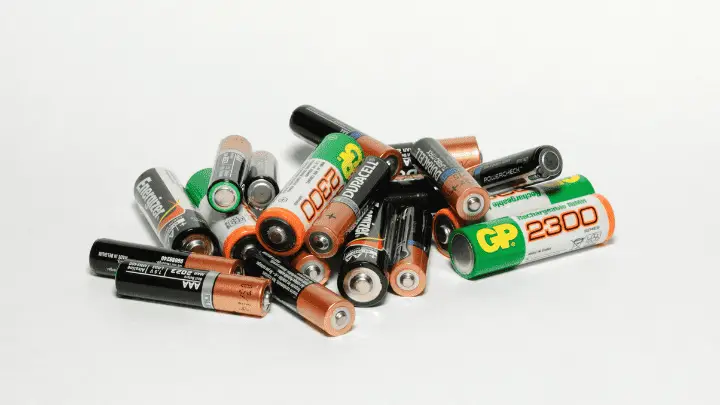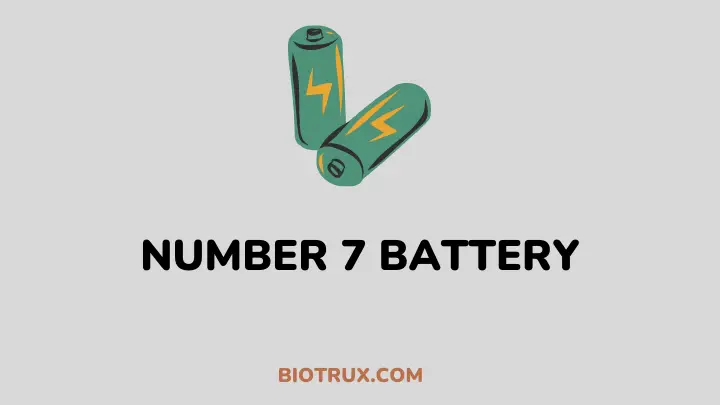Have you ever wondered about the different types of batteries available in the market and how they work? One of the most common types is the number 7 battery, widely used in various electronic devices like flashlights, radios, and toys.
The number 7 battery has several advantages and also has some limitations. Overall, the number 7 battery is a good choice for various devices.
In this article, I will discuss the specifications, advantages, and limitations of the number 7 battery in more detail. So, whether you are looking for a new battery for your remote control or are curious about the number 7 battery, read on for more information.
What is a Number 7 Battery?
A Number 7 battery, also known as the 7-size battery, is a cylindrical cell widely used to power various electronic devices.
It belongs to the larger family of alkaline batteries and provides a reliable energy source for high- and low-drain applications.
The Number 7 battery is compact, portable, and designed to deliver a consistent voltage output for extended periods.
Specifications of Number 7 Battery

Number 7 batteries boast several specifications, making them popular among consumers. Let’s take a closer look at its key features:
1. Size and Shape
A number 7 battery is a cylindrical battery that is 10.15mm in diameter and 44mm tall. It has a positive terminal at one end and a negative terminal at the other. The battery is made of zinc and carbon. It is used in various devices, including hearing aids, cameras, and toys.
2. Voltage Output
Fully charged number 7 batteries provide a steady voltage output of around 1.5 volts. This voltage remains consistent throughout its lifespan, ensuring optimal performance in devices that rely on this power source.
3. Capacity
Number 7 batteries offer a respectable capacity, allowing them to power devices for extended periods. On average, they provide around 5000mAh of charge, ensuring a reliable energy supply for your electronic gadgets.
4. Shelf Life
One of the advantages of Number 7 batteries is their impressive shelf life. When stored properly in a cool and dry environment, they can retain up to 80% of their initial charge for up to three years.
This longevity makes them convenient for emergency preparedness kits or infrequently used devices.
Advantages of Number 7 Battery
Number 7 batteries have many advantages that contribute to their widespread popularity. Here are some notable benefits:
1. Longevity and durability
Number 7 batteries are built to last, offering a robust power source for your devices. With their high-quality construction and reliable performance, these batteries ensure extended usage times, reducing the need for frequent replacements.
2. Versatility
Due to their universal size and compatibility, Number 7 batteries can power various devices. From flashlights and remote controls to small electronics and children’s toys, these batteries provide the energy to keep your gadgets running smoothly.
3. Easy availability
Number 7 batteries are readily available in most retail stores, making them easily accessible to consumers. Whether you need a replacement battery or want to stock up on spares, you’ll likely find them in supermarkets, convenience stores, and electronics retailers.
4. Cost-effectiveness
Compared to other battery sizes, these batteries are relatively affordable. Their reasonable pricing, coupled with their long lifespan, offers excellent value for money. You can power your devices without breaking the bank.
Limitations of Number 7 Battery
While number 7 batteries have numerous advantages, their limitations must also be considered. Here are a few drawbacks to keep in mind:
1. Limited energy capacity
Due to their compact size, Number 7 batteries have a limited energy capacity compared to larger batteries. While they are suitable for low-drain devices, high-drain electronics may require more powerful batteries for extended usage.
2. Disposal considerations
Like all batteries, Number 7 batteries eventually end their lifespan. Proper disposal is crucial to minimize environmental impact. Recycling used batteries at designated collection points or following local regulations regarding battery disposal is recommended.
FAQs
Are Number 7 batteries rechargeable?
No, Number 7 batteries are non-rechargeable. They are designed for single use and cannot be recharged once depleted. It’s important to dispose of them properly and replace them with fresh batteries when needed.
Can Number 7 batteries be used interchangeably with other battery sizes?
No, Number 7 batteries are specific to devices requiring this size. Attempting to use a different battery size may lead to compatibility issues or potential damage to the device.
Are Number 7 batteries safe to use?
Yes, Number 7 batteries are safe when handled and used correctly. However, it’s important to store them in a cool and dry place, away from heat sources, and to avoid puncturing or tampering with them.
How long do number 7 batteries last in a typical device?
The lifespan of a Number 7 battery in a device depends on various factors, such as the device’s power consumption and usage patterns. These batteries have a discharging time of about 140 minutes.
Can you use Number 7 batteries in extreme temperatures?
Number 7 batteries perform best within a moderate temperature range. Extreme heat or cold can affect their performance and shorten their lifespan. It’s advisable to avoid exposing these batteries to extreme temperatures.
Summary
In conclusion, the number 7 battery is a versatile and reliable power source with several advantages. It is lightweight, compact, and has a long shelf life. It is also relatively inexpensive and easy to find. However, it does have some limitations, such as a relatively low capacity and a tendency to leak.
Overall, the number 7 battery is a good choice for various applications, but it is important to know its limitations before using it.
Here are some additional things to keep in mind when using number 7 batteries:
- Use it in devices that have a low-power draw.
- Do not store it in extreme temperatures.
- Dispose of it properly when it is no longer usable.
I hope you found this article helpful. You can also learn more about single-A batteries.
Thanks for reading.
